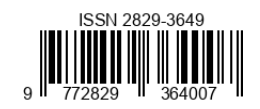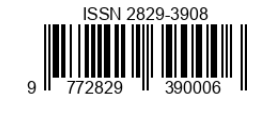Meta-analysis: The Effectiveness of Using Socio-scientific Issues on Science Literacy and Students' Higher-Order Thinking Ability in Science Learning
DOI:
https://doi.org/10.56910/literacy.v1i2.221Keywords:
Socio-scientific Issues, Higher Order Thinking Skills, Scientific Literacy, Science Learning.Abstract
This study aims to determine the effectiveness of the use of socio-scientific issues on scientific literacy and higher order thinking skills of students in science learning. This research is a type of meta-analysis research. This research data comes from the analysis of 20 national or international journals that have been published from 2016-2022. The search for data sources comes from the Google Scholar, Eric Journal, ScienceDirect, and Springer databases. The sampling technique is purposive sampling technique. The data that is used as a sample must know the criteria that have a relationship with the research variables, namely social science on scientific literacy and students' higher order thinking skills in science learning. Data analysis is a quantitative data analysis technique with the help of JSAP.. The results of the study indicate that the use of socio-scientific issues affects students' higher order thinking skills by 47% and scientific literacy by 53% with an n-Gain of 0.50 medium category. This shows that the use of socio-scientific issues in science learning has a significant effect on students' higher-order thinking skills and scientific literacy.
References
Abdul Razak , Tomi Apra Santosa, Lufri, Z. (2021). Meta-Analisis: Pengaruh Soal HOTS (Higher Order Thinking Skill) Terhadap Kemampuan Literasi Sains dan Lesson Study Siswa Pada Materi Ekologi dan Lingkungan Pada Masa Pandemi Covid-19. Bioedusiana: Jurnal Pendidikan Biologi, 6(1), 79–87.
Andari, A. R., & Setiawan, B. (2014). Literasi Sains Siswa SMP dalam Pembelajaran IPA. Pendekar:Jurnal Pendidikan Berkarakter, 5(2), 1–7.
Çalik, M., & Coll, R. K. (2012). Investigating Socioscientific Issues via Scientific Habits of Mind: Development and validation of the Scientific Habits of Mind Survey. International Journal of Science Education, 34(12), 1909–1930. https://doi.org/10.1080/09500693.2012.685197
Fahrisa, N. (2022). Journal of Environmental and Science Education Creative Problem Solving ( CPS ) Learning to Improve Ability an Strudent ’ s Critical and Creative Thinking on Science Materials. Journal of Enviromental and Science Education, 2(2), 98–105. https://doi.org/DOI: https://doi.org/10.15294/jese.v2i2.5564
Fradila, E., Razak, A., Santosa, T. A., Arsih, F., & Chatri, M. (2021). Development Of E-Module-Based Problem Based Learning (PBL) Applications Using Sigil The Course Ecology And Environmental Education Students Master Of Biology. International Journal of Progressive Sciences and Technologies (IJPSAT, 27(2), 673–682. http://ijpsat.ijsht-journals.org
Gavronskaya, Y., Larchenkova, L., Berestova, A., Latysheva, V., & Smirnov, S. (2022). The Development of Critical Thinking Skills in Mobile Learning : Fact- Checking and Getting Rid of Cognitive Distortions. International Journal of Cognitive Research in Science, Engineering and Education (IJCRSEE), 10(2), 51–68. https://doi.org/10.23947/2334-8496-2022-10-2-51-68
Hestiana, H., & Rosana, D. (2020). The Effect of Problem Based Learning Based Sosio-Scientific Issues on Scientific Literacy and Problem-Solving Skills of Junior High School Students. Journal of Science Education Research, 4(1), 15–21. https://doi.org/10.21831/jser.v4i1.34234
Indah, Asra, Azrita, S. R. T. (2021). Developing Higher Order Thingking Skills Assesment Instruments On Invironmental Pollution Material For Class VII. Journal of Biological Science and Education (JBSE), 3(1), 1–13.
Khalid, L., Bucheerei, J., Issah, M. (2021). Pre-Service Teachers Perceptions of Barriers to Promoting Critical thinking in the Classroom. Sage Journal, 11(3), 1–9. https://doi.org/https://doi.org/10.1177/21582440211036094
Masfuah, S., & Pratiwi, I. A. (2013). Peningkatan Kemampuan Pemecahan Masalah Siswa Melalui Pembelajaran Problem Based Learning Berbasis Socio Scientific Issues. Edukasi, 10(2), 179–190.
Mudawamah, K. (2020). Peningkatan Hasil Belajar dan Literasi Sains Peserta Didik Kelas VII A SMPN 1 Ngoro Mojokerto melalui Penerapan Pendekatan Saintifik Berbasis Socio-scientific issues Materi Pencemaran Lingkungan. 2(2), 52–65.
Naezak, N. A., Savitri, E. N., & Fibriana, F. (2021). Simple Terrarium Teaching Aid for Guided Inquiry Learning Model: The Development of Learning Instruments to Students’ Concept Understanding in Global Warming and Environmental Awareness. Journal of Innovation in Educational and Cultural Research, 2(2), 51–59. https://doi.org/10.46843/jiecr.v2i2.37
Nazilah, N., Muharrami, L. K., Rosidi, I., Yuniasti, A., & Wulandari, R. (2019). Pengaruh Bahan Ajar Berbasis Socio-Scientific Issues Pada Materi Pemanasan Global Terhadap Kemampuan Literasi. 2(1), 8–16.
Nia Alfitriyani, Indarini Dwi Pursitasari, S. K. (2021). Biotechnology Module Based On Sociosaintific Issues To Improve Student ’ S Critical Thinking. 12(1). https://doi.org/10.26418/jpmipa.v12i1.43179
Nugraha, A. J., Suyitno, H., & Susilaningsih, E. (2017). Analisis Kemampuan Berpikir Kritis Ditinjau dari Keterampilan Proses Sains dan Motivasi Belajar melalui Model PBL Abstrak. Journal of Primary Education, 6(1), 35–43.
OECD. (2019). Programme for International Students Assessment (PISA)- Results from PISA 2018, Country Note: Indonesia.
Pauzi, R. Y., & Windiaryani, S. (2021). Critical thinking skills on global warming issue: Effect of the socio- scientific problems approach on problem-solving toward student’s. Biosfer:Jurnal Pendidikan Biologi, 14(2), 228–237. https://doi.org/https://doi.org/10.21009/biosferjpb.19963
Purnami, W., Sarwanto, S., Suranto, S., Suyanti, R. D., & Mocerino, M. (2021). Investigation of Science Technology Ecocultural Society (STEcS) Model to Enhance Eco Critical Thinking Skills. Journal of Innovation in Educational and Cultural Research, 2(2), 77–85. https://doi.org/10.46843/jiecr.v2i2.40
Rahayu, I. D., Permanasari, A., & Heliawati, L. (2022). The Effectiveness of Socioscientific Issue-Based Petroleum Materials Integrated with The Elsmawar Website on Students’ Scientific Literacy. Journal of Innovation in Educational and Cultural Research, 3(2), 279–286. https://doi.org/10.46843/jiecr.v3i2.118
Rahmasiwi, A., Susilo, H., & Suwono, H. (2018). Pengaruh Pembelajaran Diskusi Kelas Menggunakan Isu Sosiosains Terhadap Literasi Sains Mahasiswa Baru pada Kemampuan Akademik Berbeda. Jurnal Pendidikan, 3(8), 980–989.
Rohmawati, E., Widodo, W., & Agustini, R. (2018). Membangun Kemampuan Literasi Sains Siswa Melalui Pembelajaran Berkonteks Socio-Scientific Issues Berbantuan Media Weblog. Jurnal Penelitian Pendidikan IPA, 3(1), 8–14. https://doi.org/10.26740/jppipa.v3n1.p8-14
Rostikawati, D. A., & Permanasari, A. (2016). Rekonstruksi Bahan Ajar dengan Konteks Socio-Scientific Issues pada Materi Zat Aditif Makanan untuk Meningkatkan Literasi Sains Siswa Reconstruction of Learning Materials with Socio-Scientific Issues Context on Food Additives Content to Improving Student’. Jurnal Inovasi Pendidikan IPA, 2(2), 156–164.
S. N. Pratiwi, C Cari, N. S. A. (2019). Pembelajaran IPA Abad 21 dengan Literasi Sains Siswa. Jurnal Materi Dan Pembelajaran Fisika (JMPF), 9(1), 34–42.
Santosa, T. A., Razak, A., Arsih, F., & Sepriyani, E. M. (2021). Meta-Analysis : Science Learning Based on Local Wisdom Against Preserving School Environments During the Covid-19 Pandemic. Journal of Biology Education, 10(2), 244–251.
Santosa, T. A., Razak, A., Lufri, L., Zulyusri, Z., Fradila, E., & Arsih, F. (2021). Meta-Analisis: Pengaruh Bahan Ajar Berbasis Pendekatan STEM Pada Pembelajaran Ekologi. Journal of Digital Learning and Education, 1(01), 1–9. https://doi.org/10.52562/jdle.v1i01.24
Schleicher, A. (2019). PISA 2018: Insights and Interpretations.
Shinta, Z. El, Sunyono, S., & M, S. (2020). The Validity of the Online Module of Flipped Classroom Based on Socioscientific Issues Towards Students’ Literacy Skills. IOSR Journal of Research & Method in Education, 10(2), 51–56. https://doi.org/10.9790/7388-1002045156
Sismawarni, W. U. D., Usman, U., Hamid, N., & Kusumaningtyas, P. (2020). Pengaruh Penggunaan Isu Sosiosaintifik dalam Model Pembelajaran Berbasis Masalah Terhadap Keterampilan Berpikir Tingkat Tinggi Siswa. Jambura Journal of Educational Chemistry, 2(1), 10–17. https://doi.org/10.34312/jjec.v2i1.4265
Suhaimi, Tomi Apra Santosa, S. A. (2022). Analisis Pendekatan Saintifik Dalam Pembelajaran IPA Selama Pandemi Covid-19 di Sekolah Dasar. Jurnal DIDIKA : Wahana Ilmiah Pendidikan Dasar, 8(1), 92–101.
Sumarni, W. (2018). The Influence Of Ethnoscience-Based Learning On Chemistry To The Chemistry’s Literacy Rate Of The Prospective Teachers. Unnes Science Education Journal, 7(2), 198–205.
Suparman, et al. (2022). Development of Attitude Assessment Instruments Towards Socio- Scientific Issues in Chemistry Learning. 11(4), 1947–1958. https://doi.org/dio.org/10.12973/eu-jer.11.41949
Sya’ban, M.F., & Wilujeng, I. (2016). Pengembangan SSP Zat dan Energi Berbasis Keunggulan Lokal untuk Meningkatkan Literasi Sains dan Kepedulian Lingkungan. Jurnal Inovasi Pendidikan IPA, 2(2), 156–164. https://doi.org/http://dx.doi.org/10.21831/jipi.v2i2.8814
Yuriza, P. E., Adisyahputra, A., & Sigit, D. V. (2018). Correlation between higher-order thinking skills and level of intelligence with scientific literacy on junior high school students. Biosfer, 11(1), 13–21. https://doi.org/10.21009/biosferjpb.11-1.2
Zeidler, D. L., Florida, S., Nichols, B. H., & Florida, S. (2009). Socioscientific Issues : Theory and Practice. 21(2), 49–58.
Zulyusri, Santosa, T. A., & Yulianti, S. (2022). Content Knowledge ( TPACK ) Model Through Online Learning. International Journal of Progressive Sciences and Technologies (IJPSAT), 34(2), 285–294.







